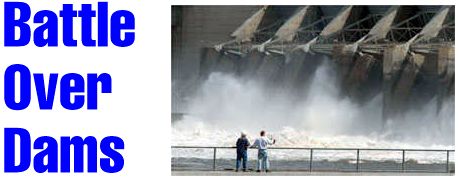forum
library
tutorial
contact

Ag Group Seeking Ways to Save Salmon
by Terry HudsonTri-City Herald, December 2, 1999
|
the film forum library tutorial contact |

|
Ag Group Seeking Ways to Save Salmonby Terry HudsonTri-City Herald, December 2, 1999 |
 HERMISTON - For years Gary Reed, superintendent at the Hermiston
Agriculture Research Center, pushed for funding ocean salmon
research.
HERMISTON - For years Gary Reed, superintendent at the Hermiston
Agriculture Research Center, pushed for funding ocean salmon
research.
That may seem strange for someone based in Eastern Oregon. But with a federal study under way that could end with the breaching of dams on the Lower Snake River as a way to bolster salmon populations, the center's advisory board decided it needed to do something to save salmon.
That was the beginning of a joint effort between Hermiston's agricultural center and the Coastal Oregon Marine Station in Newport that will result in the funding of two positions to study salmon populations in the ocean.
"Five years ago, Gary brought the advisory board to meet with the coastal advisory board," said Lavern Weber, a researcher from the Newport station. "We would have never looked to Hermiston. Hermiston added one question: What's happening to salmon in the ocean."
That cooperative effort paid off during the last legislative session, when the groups were able to secure $450,000 for each the next two years for a salmon ecology study.
"We have a big black hole out there we know nothing about," Weber said. "From that meeting we began to build momentum. Last session we obtained the funding to answer that (question)."
The ocean research presentation was made Thursday morning during the second day of the 26th annual Hermiston Farm Fair. The farm fair continues today from 8:30 until noon.
The new positions funded by the state include a marine fisheries ecologist, who will conduct research in the ocean.
"We need to understand the entire life history of salmon," said Gil Sylvia, superintendent at the Newport station. "We need to know what is occurring when salmon are in the ocean and how it offsets the population."
The second position is a marine fisheries geneticist, who will help study whether salmon from different habitats have different genetic makeup and if they behave differently in the ocean.
"These people can ask the right questions with respect to the ocean," Sylvia said. "Sometimes we get too specialized and only look at one set of issues. We're looking at one part of one river system. These two positions will help us avoid doing that.
"The way laws are written, we have to protect the fish. To some people this is not balanced because they're only using caution in one area. If you can't demonstrate your position with knowledge, you won't be able to fish - the way many people won't be able to farm."
Sylvia explained that during the most recent El Niņo there was a shift in species throughout North American waters because of changing temperatures. This may have brought in species that preyed heavily on salmon smolts.
The fisheries positions will be filled next summer, but Sylvia warned not to expect any quick solutions.
"We won't have any answers in a six-month or a year time frame," he said. "It's going to take two, five, maybe 10 years of research."
That may be too late to have any effect on decisions on dam breaching, but there is hope some leverage can be applied to wait until all the science is in.
"We'll certainly work within the courts to let them know about this research before any of those decisions are made," Reed said.
learn more on topics covered in the film
see the video
read the script
learn the songs
discussion forum
